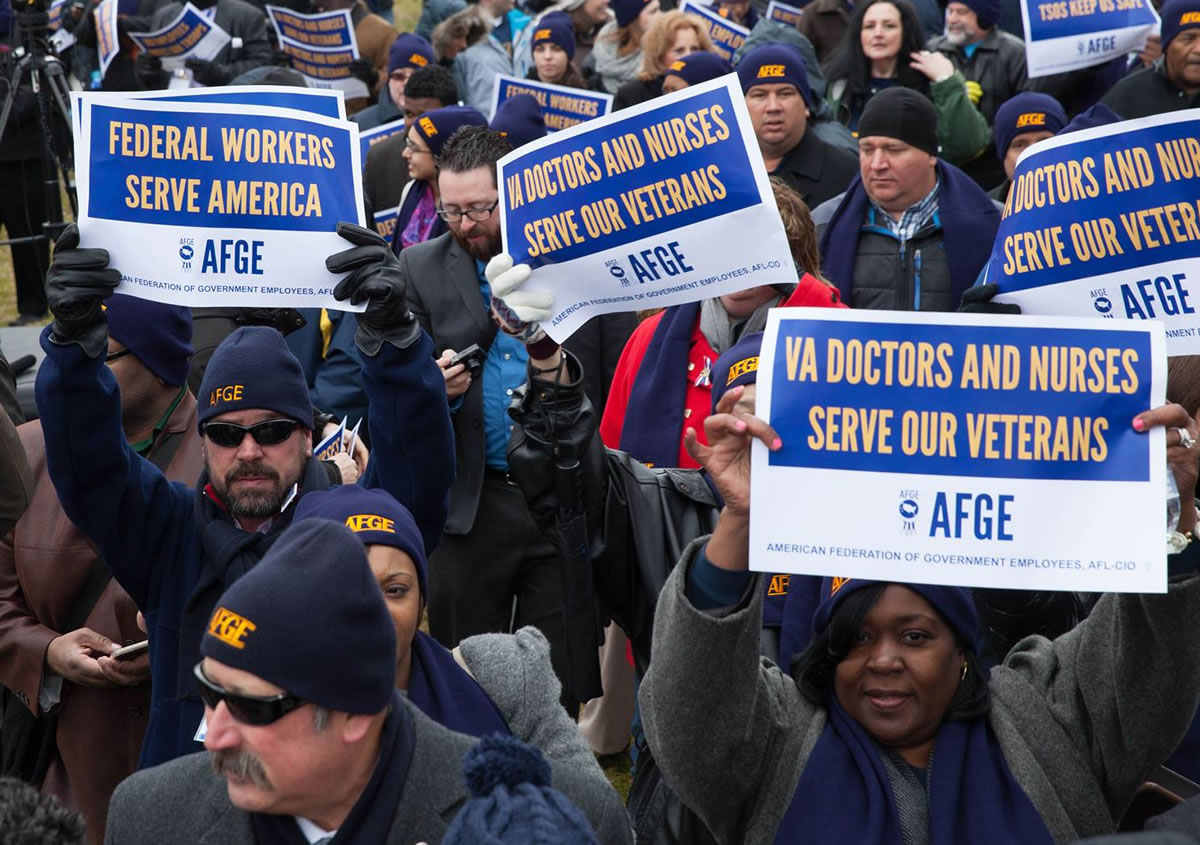

Share
Three unions representing federal workers and two influential lawmakers on government workforce issues denounced Republican President Donald Trump’s decision, carrying out yet another campaign promise, to freeze hiring of federal workers.
American Federation of Government Employees President J. David Cox – whose union represents more federal employees, 310,000, than any other – predicted Trump’s action would boomerang. That’s because freezing and cutting the numbers of federal workers would force Trump’s agencies to hire more-expensive and less-accountable outside contractors.
Trump’s executive order on Jan. 23 halts the federal workforce in place, except for national security and defense workers, who are two-thirds of all federal workers. The government now employs 2.2 million people, not counting the Postal Service, which is independent.
That means everything else – from jails to veterans hospitals to Social Security checks to food inspection – will suffer from worker loss, contracting out, or both, Cox pointed out.
Trump’s order plays not only to his campaign promises, but to long-lasting Republican bias against federal workers and their unions. With few exceptions, the GOP uses federal workers as everything from a political piñata to a source of funds, taken through increased worker pension contributions and past pay freezes, to close budget deficits. Thus the freeze promise.
The freeze “will disrupt government programs and services that benefit everyone and actually increase taxpayer costs by forcing agencies to hire more expensive contractors to do work that civilian government employees are already doing for far less,” Cox explained.
The North Carolina native, a retired VA psychiatric nurse, also said 85 percent of the 2.2 million feds – the fewest in 55 years — live and work outside the D.C. metro area, contrary to popular impressions. So a federal workforce freeze harms communities nationwide.
“Meanwhile, the number of contractors employed by the government has grown to at least twice the number of full-time federal employees, and trillions of dollars have been wasted on service contracts and mismanaged weapons systems,” Cox said. “Numerous studies have shown contractors are two to three times more costly than each employee they replace.”
Presidents of the Treasury Employees and the National Federation of Federal Employees, a Machinists sector, made similar points. So did the Letter Carriers, though its members may not be directly affected. NALC joined a protest letter that 106 lawmakers sent Trump. So did House Minority Whip Steny Hoyer, D-Md., and Rep. Gerry Connolly, D-Va., the Ranking Democrat on the House Subcommittee on Government Operations.
“President Trump needs to stop campaigning and start governing. This executive order shows he is still campaigning, only now he is doing it at the taxpayers’ expense,” said new
NFFE President Randy Erwin. “I do not think President Trump understands the crippling effect a hiring freeze has on the ability of agencies to function, or perhaps he just does not care. Either way, this is bad news for the American people.”
“A hiring freeze will increase backlogs, decrease service quality and frustrate Americans seeking help from their government,” said NTEU President Tony Reardon. “Empty desks, dormant computers and ringing telephones don’t deliver vital public services and safeguard our nation, federal workers do.”
Hoyer, whose district includes many blue-collar federal workers, said the hiring freeze “will do nothing to streamline government operations or reap significant budget savings. On the contrary; it will hinder the functioning and efficiency of our government by forcing fewer workers to serve more and more Americans and deterring our best and brightest young people from entering the federal workforce.”
Connolly called the hiring freeze “a mindless way to manage. It fails to differentiate critical from non-critical issues. It fails to take into account the need to actually beef up certain capabilities in the federal government, like cybersecurity.”

